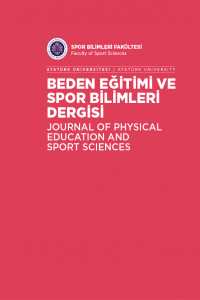COVID-19 PANDEMİSİNDE SPOR BİLİMLERİ ALANLARINDAKİ YÜKSEKÖĞRETİM ÖĞRENCİLERİNİN ANKSİYETE DÜZEYLERİ VE EGZERSİZ BAĞIMLILIĞI
Öz
Bu çalışmada, spor bilimlerinin farklı bölümlerinde okuyan öğrencilerin, SARS-CoV-2 pandemisi döneminde egzersiz bağımlılığı düzeyleri ile salgın hastalıktan kaynaklı anksiyete durumlarının incelenmesi amaçlandı.
Araştırmanın örneklemini 2020 – 2021 akademik yılı bahar döneminde, aktif olarak spor yaşantısını sürdüren ve rastgele yöntemle seçilmiş 525 spor bilimleri öğrencisi oluşturdu. Bu çalışmada, nicel araştırma yöntemlerinden tarama modeli kullanıldı ve betimsel bir çalışma olarak desenlendi. Katılımcılara demografik özelliklerinin sorgulandığı kişisel bilgi formu, Lee (2021) tarafından geliştirilen Koronavirüs Anksiyete Ölçeği ile Demir, Hazar ve Cicioğlu’nun (2018) geliştirdiği Egzersiz Bağımlılığı Ölçeği uygulandı ve veriler Google Formlar aracılığıyla dijital ortamda toplandı. Verilerin çözümlenmesinde SPSS 23.0 istatistiksel paket programı kullanıldı ve verilerin analizin de bağımsız t-testi ve tek yönlü varyans (ANOVA) analiz yöntemleri uygulandı.
Öğrencilerin %25,7’sinde COVID-19 kaynaklı anksiyete bulunduğu ve öğrencilerin tamamı bağımlı grup seviyesinde (57,85±12,53) egzersiz bağımlısı olduğu görüldü. Cinsiyet ve yaş değişkenine göre anksiyete durumlarında farklılık gözlenmedi ancak (p>,05) yaş seviyesi arttıkça anksiyete düzeyinde düşüş, egzersiz bağımlılığında ise artış olduğu tespit edildi. Antrenörlük Eğitimi (AE) ve Beden Eğitimi ve Spor Öğretmenliği (BSÖ) bölümü öğrencilerinin anksiyetesi Rekreasyon Eğitimi (RE) ve Spor Yöneticiliği Bölümü (SYB) öğrencilerine göre anlamlı düzeyde yüksek (p<,05) ve anksiyeteli BSÖ öğrencileri diğer tüm bölümlere göre daha yüksek egzersiz bağımlısıdır. Anksiyeteli öğrencilerde sınıf seviyesi yükseldikçe anksiyete düzeyleri ve egzersiz bağımlılığı da artmaktadır. Takım sporlarıyla ilgilenen öğrencilerin anksiyetesi yüksektir ve anlamlı düzeyde egzersiz bağımlısıdır. Ayrıca profesyonel düzeyde spor yapan öğrenciler, amatör sporculara kıyasla yüksek egzersiz bağımlısı kategorisindedir. SARS-CoV-2 salgın hastalığından kaynaklı anksiyetesi bulunmayan öğrenciler, anksiyeteli bireylere göre yüksek düzeyde anlamlı egzersiz bağımlısı olmakla birlikte (p<,000), anksiyeteli olup / olmama durumu dikkate alınmadığında tüm spor bilimleri öğrencilerinin pandemi sürecinde bağımlı grup seviyesinde egzersiz bağımlısı olduğu sonucuna ulaşılmıştır.
Anahtar Kelimeler
Kaynakça
- Referans 1 Lee S. A. (2020b). Replication analysis of the Coronavirus Anxiety Scale. Düşünen Adam. The Journal of Psyhiatry and Neurological Sciences, 2020(33), 203-205. DOI:10.14744/DAJPNS.2020.00079
- Referans 2 Evren, C., Evren, B., Dalbudak, E., Topcu M., ve Kutlu N. (2020). Measuring anxiety related to COVID-19: A Turkish validation study of the Coronavirus Anxiety Scale. Death Studies. DOI : https://doi.org/10.1080/07481187.2020.1774969
- Referans 3 17. Demir, G. T., Hazar, Z. & Cicioğlu, H. İ. (2018). Egzersiz bağımlılığı ölçeği (EBÖ): Geçerlik ve güvenirlik çalışması. Kastamonu Eğitim Dergisi, 26(3), 865-874.
ANXIETY LEVELS AND EXERCISE ADDICTION IN HIGHER EDUCATION STUDENTS STUDYING SPORTS SCIENCES DURING THE COVID-19 PANDEMIC
Öz
This study aimed to investigate the exercise addiction levels and pandemic-related anxiety states of the students studying in different departments of sports sciences during the SARS-CoV-2 pandemic period.
The sample of the study consisted of 525 randomly selected sports sciences students who actively continued their sports lives in the spring semester of the 2020-2021 academic year. In this study, the survey model, which is one of the quantitative research methods, was used, and the study was designed as a descriptive study. Personal information form through which the demographic characteristics of the participants were questioned, Coronavirus Anxiety Scale developed by Lee (2021), and the Exercise Addiction Scale developed by Demir, Hazar, and Cicioglu (2018) was applied, and data were collected in the digital environment through Google Forms. SPSS 23.0 statistical package program was used, and independent t-test and one-way analysis of variance (ANOVA) methods were applied in the analysis of the data.
It was observed that 25.7% of the students had anxiety caused by COVID-19, and that all of the students had exercise addiction at the dependent group level (57.85±12.53). No difference was observed in the anxiety states according to gender and age variables; however, (p>.05) it was determined that there was a decrease in the anxiety level and an increase in exercise addiction as the age level increased. Anxiety levels of the students studying in the programs of Coaching Education (CE) and Physical Education and Sports Teaching (PEST) were significantly higher than the students studying in the departments of Recreation Education (RE) and Sports Management (SM) (p<.05), and the students with anxiety studying in the department of PEST had a higher level of exercise addiction compared to students in all other departments. As the year of study level of students with anxiety increased, their anxiety levels and exercise addiction also increased. Anxiety levels of the students involved in the team sports were high and these students had exercise addiction at a significant level. In addition, students involved in sports at a professional level were in the category of high-level exercise addiction compared to amateur athletes. It was observed that students who did not have SARS-CoV-2 pandemic-related anxiety were highly and significantly addicted to exercise compared to individuals with anxiety (p<0.000); however when the anxiety states were ignored, it was concluded that all sports science students had exercise addiction at the dependent group level during the pandemic period.
Anahtar Kelimeler
Kaynakça
- Referans 1 Lee S. A. (2020b). Replication analysis of the Coronavirus Anxiety Scale. Düşünen Adam. The Journal of Psyhiatry and Neurological Sciences, 2020(33), 203-205. DOI:10.14744/DAJPNS.2020.00079
- Referans 2 Evren, C., Evren, B., Dalbudak, E., Topcu M., ve Kutlu N. (2020). Measuring anxiety related to COVID-19: A Turkish validation study of the Coronavirus Anxiety Scale. Death Studies. DOI : https://doi.org/10.1080/07481187.2020.1774969
- Referans 3 17. Demir, G. T., Hazar, Z. & Cicioğlu, H. İ. (2018). Egzersiz bağımlılığı ölçeği (EBÖ): Geçerlik ve güvenirlik çalışması. Kastamonu Eğitim Dergisi, 26(3), 865-874.
Ayrıntılar
| Birincil Dil | Türkçe |
|---|---|
| Konular | Spor Hekimliği |
| Bölüm | Makaleler |
| Yazarlar | |
| Yayımlanma Tarihi | 31 Aralık 2021 |
| Kabul Tarihi | 14 Aralık 2021 |
| Yayımlandığı Sayı | Yıl 2021 Cilt: 23 Sayı: 4 |

